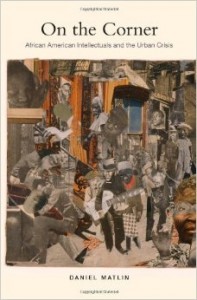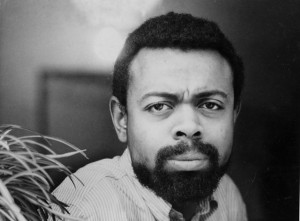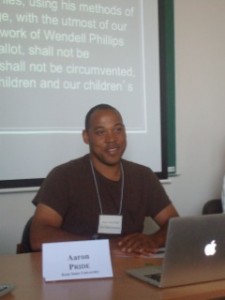Daniel Matlin. On the Corner: African American Intellectuals and the Urban Crisis (Cambridge: Harvard University Press, 2014) 350 pages.
Review by Aaron Pride
The African American experience in the United States has been full of pitfalls and perilous challenges. These obstacles have been particularly daunting for African American intellectuals and scholars that have aimed to represent the race to the American public. In On the Corner: African American Intellectuals and the Urban Crisis, Daniel Matlin, professor at King’s College, examines African American intellectual life through the  experiences of Romare Bearden, Kenneth Clark, and Everett Leroy Jones. He describes these men as, “down on the streets of black America and so uniquely positioned to convey to white audiences the physical, social, and emotional realities of life in black urban communities.” Intellectuals have been responsible for interpreting and articulating the meanings of American civilization to the masses and the public. Matlin asserts that this holds true for African American intellectuals and their relationship to black people. He argues that the emergence of the black public intellectual in the 1960s, “inaugurated a new phase in the history of black intellectual life, one in which long-standing notions of racial representation and responsibility were reformulated around the task of interpreting and transforming-black urban communities.” The intersection between racial obligation and intellectual proclivity proved to be a difficult balancing act for African American intellectuals.[1]
experiences of Romare Bearden, Kenneth Clark, and Everett Leroy Jones. He describes these men as, “down on the streets of black America and so uniquely positioned to convey to white audiences the physical, social, and emotional realities of life in black urban communities.” Intellectuals have been responsible for interpreting and articulating the meanings of American civilization to the masses and the public. Matlin asserts that this holds true for African American intellectuals and their relationship to black people. He argues that the emergence of the black public intellectual in the 1960s, “inaugurated a new phase in the history of black intellectual life, one in which long-standing notions of racial representation and responsibility were reformulated around the task of interpreting and transforming-black urban communities.” The intersection between racial obligation and intellectual proclivity proved to be a difficult balancing act for African American intellectuals.[1]
The black freedom struggles of the 1960s serve as a historical and contextual background and spans the decade as several leading African American intellectuals gained public notoriety and sought to explain urban unrest. Matlin’s reasoning for the selection of this era is that it provided new opportunities for black intellectuals to articulate the rationale of black frustration to white audiences. In addition, he demonstrates that these intellectuals from various political traditions and persuasions drew upon a common reservoir of ideas. He persuasively argues that the climate of social upheaval offered African American intellectuals a newfound racial authority in the United States.One enigma that Matlin attempts to unravel is how much common intellectual ground existed across the political spectrum and the meaning of racial identity.
The tension between representing the race and pursuing purely intellectual interests among black intellectuals is the crux of Matlin’s argument. White expectations and notions of black solidarity and the claim of being uniquely qualified to represent the race and examine racial problems circumscribed black intellectual life. This responsibility to the race presented a dilemma. Everett Leroy Jones epitomized the constraints placed on black leaders in this era. The transformation of Jones to Amiri Baraka reflected the difficulties of attempting to represent the race before the white public. Baraka’s shifting allegiances from the mostly white artistic and literary community in Greenwich  Village to the black majority in Newark that supported black power and black cultural experiences illustrated the burdens for African American intellectuals. He was torn between the lure of his artistic pursuits and his obligation to the black community. Matlin’s examination initiates a broader conversation about African American intellectual life, and addresses questions of racial authenticity have bedeviled the lives of black leaders from W.E.B. Du Bois to Barack Obama. These issues remain a constant source of debate in African American history and challenges historians and scholars to provide a more nuanced lens of analysis to explore the complexities of its intellectual life.
Village to the black majority in Newark that supported black power and black cultural experiences illustrated the burdens for African American intellectuals. He was torn between the lure of his artistic pursuits and his obligation to the black community. Matlin’s examination initiates a broader conversation about African American intellectual life, and addresses questions of racial authenticity have bedeviled the lives of black leaders from W.E.B. Du Bois to Barack Obama. These issues remain a constant source of debate in African American history and challenges historians and scholars to provide a more nuanced lens of analysis to explore the complexities of its intellectual life.
On the Corner makes a substantial contribution to a complex African American intellectual history by chronicling a multitude of ideas and concepts in the notions of racial identity in art, literature, public policy and community engagement. It adds to the vast scholarship on black social pathology imagery and its relationship to the African American community. Matlin suggests marking out a middle road between using black pathology to explain economic and social inequity and romanticizing black life and experiences. Moreover, Matlin describes how ideas associated with black social pathology found wide currency in the African American community from liberal stalwarts of the civil rights movement to black power advocates. Drawing on a vast array of sources including books, poetry, plays, policy papers, and community organizations, the book’s expansive treatment of intellectual production allows historians to analyze the social circulation of ideas. One of the few weaknesses of the book is the author’s selection of exclusively male subjects and their common backgrounds in professional black households. A more diverse pool of subjects could have made the argument more persuasive. Nonetheless, On the Corner is an indispensable study of black intellectual life.
For intellectual historians, scholars of the American experience, and readers of this blog, On the Corner provides insight into the role of intellectuals in sustaining a collective identity and community. Delving into the politics of respectability, the author illustrates class tensions within the black community and among intellectuals as the period witnessed the emergence of critiques of middle class respectability. These debates over racial authenticity sought to redefine blackness in American society and Matlin effectively describes how black intellectuals responded to liberation struggles and attempted to reshape the image of urban life. On the Corner provides an account of the transformation of perceptions of black identity and community.
[1] Daniel Matlin, On the Corner: African American Intellectuals and the Urban Crisis (Cambridge: Harvard University Press, 2013), 8, 11.
Aaron Pride is a doctoral student at Kent State University. His area of specialization is African American history and nineteenth century American history with subfields in American i ntellectual and African history. He received his undergraduate and graduate degrees from Miami University. His dissertation is a biography of African American civil rights activist, William Monroe Trotter that focuses on the importance of religion in Trotter’s consciousness and writing. Mr. Pride’s hobbies include playing chess, running and being a volunteer track coach in the summer.
ntellectual and African history. He received his undergraduate and graduate degrees from Miami University. His dissertation is a biography of African American civil rights activist, William Monroe Trotter that focuses on the importance of religion in Trotter’s consciousness and writing. Mr. Pride’s hobbies include playing chess, running and being a volunteer track coach in the summer.

One Thought on this Post
S-USIH Comment Policy
We ask that those who participate in the discussions generated in the Comments section do so with the same decorum as they would in any other academic setting or context. Since the USIH bloggers write under our real names, we would prefer that our commenters also identify themselves by their real name. As our primary goal is to stimulate and engage in fruitful and productive discussion, ad hominem attacks (personal or professional), unnecessary insults, and/or mean-spiritedness have no place in the USIH Blog’s Comments section. Therefore, we reserve the right to remove any comments that contain any of the above and/or are not intended to further the discussion of the topic of the post. We welcome suggestions for corrections to any of our posts. As the official blog of the Society of US Intellectual History, we hope to foster a diverse community of scholars and readers who engage with one another in discussions of US intellectual history, broadly understood.
“These debates over racial authenticity sought to redefine blackness in American society and Matlin effectively describes how black intellectuals responded to liberation struggles and attempted to reshape the image of urban life.”
========================================
“Lastly, I could show fight on natural selection having done and doing more for the progress of civilisation than you seem inclined to admit. Remember what risks nations of Europe ran, not so many centuries ago, of being overwhelmed by the Turks, and how ridiculous such an idea now is! The more civilized so-called Caucasian races have beaten the Turkish hollow in the struggle for existence. Looking to the world at no very distant date, what an endless number of the lower races will have been eliminated by the higher civilized races throughout the world.” – Charles Darwin (1881 letter)
Darwin, Eugenics, Social Darwinism, and error prone genealogy were contributors to the “inferior races” ideology.
History shows that many intellectuals supported the ideology.
That should not be forgotten.